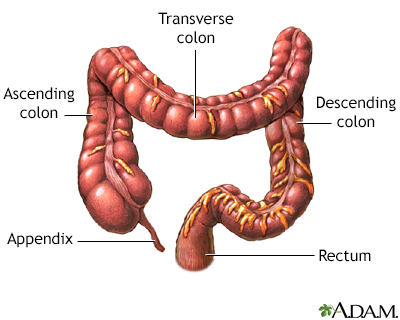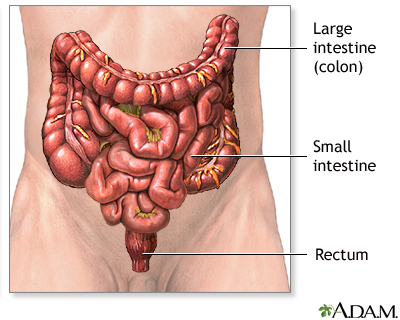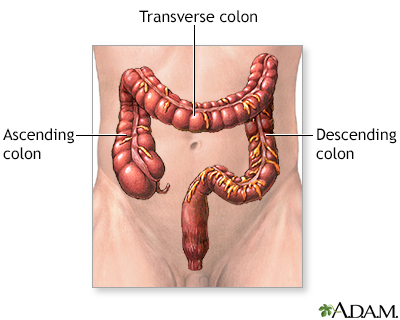Large bowel resection
Definition
Large bowel resection is surgery to remove all or part of your large bowel. This surgery is also called colectomy. The large bowel is also called the large intestine or colon.
- Removal of the entire colon and the rectum is called a proctocolectomy.
- Removal of all of the colon but not the rectum is called subtotal colectomy.
- Removal of part of the colon but not the rectum is called a partial colectomy.
The large bowel connects the small intestine to the anus. Normally, stool passes through the large bowel before leaving the body through the anus.
Alternative Names
Ascending colectomy; Descending colectomy; Transverse colectomy; Right hemicolectomy; Left hemicolectomy; Low anterior resection; Sigmoid colectomy; Subtotal colectomy; Proctocolectomy; Colon resection; Laparoscopic colectomy; Colectomy - partial; Abdominal perineal resection
Description
You'll receive general anesthesia at the time of your surgery. This will keep you asleep and pain-free.
The surgery can be performed laparoscopically or with open surgery. Depending on which surgery you have, the surgeon will make one or more cuts (incisions) in your belly.
If you have laparoscopic surgery:
- The surgeon makes 3 to 5 small cuts (incisions) in your belly. A medical device called a laparoscope is inserted through one of the cuts. The scope is a thin, lighted tube with a camera on the end. It lets the surgeon see inside your belly. Other medical instruments are inserted through the other cuts.
- A cut of about 2 to 3 inches (5 to 7.6 centimeters) may also be made if your surgeon needs to put their hand inside your belly to feel or remove the diseased bowel.
- Your belly is filled with a harmless gas to expand it. This makes the area easier to see and work in.
- The surgeon examines the organs in your belly to see if there are any problems.
- The diseased part of your large bowel is located and removed. Some lymph nodes may also be removed.
If you have open surgery:
- The surgeon makes a cut of 6 to 8 inches (15.2 to 20.3 centimeters) in your lower belly.
- The organs in your belly are examined to see if there are any problems.
- The diseased part of your large bowel is located and removed. Some lymph nodes may also be removed.
In both kinds of surgery, the next steps are:
- If there is enough healthy large intestine left, the ends are stitched or stapled together. This is called an anastomosis. Most patients have this done.
- If there is not enough healthy large intestine to reconnect, the surgeon makes an opening called a stoma through the skin of your belly. The colon is attached to the outer wall of your belly. Stool will go through the stoma into a drainage bag outside your body. This is called a colostomy. The colostomy may be either short-term or permanent.
Colectomy usually takes between 1 and 4 hours.
Why the Procedure Is Performed
Large bowel resection is used to treat many conditions, including:
- A blockage in the intestine due to scar tissue
- Colon cancer
- Diverticular disease (disease of the large bowel)
Other reasons for bowel resection are:
- Familial polyposis (polyps are growths on the lining of the colon or rectum)
- Injuries that damage the large bowel
- Intussusception (when one part of the intestine pushes into another)
- Precancerous polyps
- Severe gastrointestinal bleeding
- Twisting of the bowel (volvulus)
- Ulcerative colitis
- Bleeding from the large intestine
- Lack of nerve function to the large intestine
Risks
Risks for anesthesia and surgery in general are:
- Reactions to medicines
- Breathing problems
- Blood clots, bleeding, infection
Risks for this surgery are:
- Bleeding inside your belly
- Bulging tissue through the surgical cut, called an incisional hernia
- Damage to nearby organs in the body
- Damage to the ureter or bladder
- Problems with the colostomy
- Scar tissue that forms in the belly and causes a blockage of the intestines
- The edges of your intestines that are sewn together come open (anastomotic leak, which may be life threatening)
- Wound breaking open
- Wound infection
- Peritonitis
Before the Procedure
Tell your surgeon or nurse what medicines you are taking, even drugs, supplements, or herbs you bought without a prescription.
Talk with your surgeon or nurse about how surgery will affect:
- Intimacy and sexuality
- Pregnancy
- Sports
- Work
During the 2 weeks before your surgery:
- You may be asked to stop taking blood thinner drugs. These include aspirin, ibuprofen (Advil, Motrin), naproxen (Aleve, Naprosyn), and others.
- Ask the surgeon which drugs you should still take on the day of your surgery.
- If you smoke, try to stop. Smoking increases the risk for problems such as slow healing. Ask your doctor or nurse for help quitting.
- Tell the surgeon right away if you have a cold, flu, fever, herpes breakout, or other illness before your surgery.
- You may be asked to go through a bowel preparation to clean your intestines of all stool. This may involve staying on a liquid diet for a few days and using laxatives.
The day before surgery:
- You may be asked to drink only clear liquids such as broth, clear juice, and water.
- Follow instructions about when to stop eating and drinking.
On the day of surgery:
- Take the drugs your surgeon told you to take with a small sip of water.
- Arrive at the hospital on time.
After the Procedure
You will be in the hospital for 3 to 7 days. You may have to stay longer if the colectomy was an emergency operation.
You may also need to stay longer if a large amount of your large intestine was removed or you develop problems.
By the second or third day, you will probably be able to drink clear liquids. Thicker fluids and then soft foods will be added as your bowel begins to work again.
After you go home, follow instructions on how to take care of yourself as you heal.
Outlook (Prognosis)
Most people who have a large bowel resection recover fully. Even with a colostomy, most people are able to do the activities they were doing before their surgery. This includes most sports, travel, gardening, hiking, other outdoor activities, and most types of work.
If you have a long-term (chronic) condition, such as cancer, Crohn disease, or ulcerative colitis, you may need ongoing medical treatment.
Gallery



References
Galandiuk S, Netz U, Morpurgo E, Tosato SM, Abu-Freha N, Ellis CT. Colon and rectum. In: Townsend CM Jr, Beauchamp RD, Evers BM, Mattox KL, eds. Sabiston Textbook of Surgery. 21st ed. Philadelphia, PA: Elsevier; 2022:chap 52.
Tan WJ, Guillem JG. Surgical management of colon cancer. In: Cameron AM, Cameron JL, eds. Current Surgical Therapy. 13th ed. Philadelphia, PA: Elsevier; 2020:242-248.
Related specialties
Aftercare and more
- Bathroom safety for adults
- Bland diet
- Changing your ostomy pouch
- Ileostomy - caring for your stoma
- Ileostomy - changing your pouch
- Ileostomy - discharge
- Ileostomy - what to ask your doctor
- Ileostomy and your child
- Ileostomy and your diet
- Large bowel resection - discharge
- Low-fiber diet
- Preventing falls
- Surgical wound care - open
- Types of ileostomy
- When you have nausea and vomiting